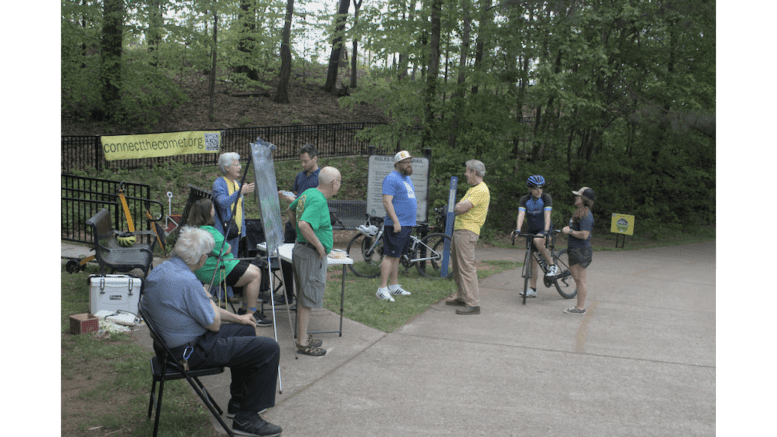On Sunday, April 16, Connect the Comet set up a table on the Silver Comet Trail roughly midway between the spur trail that begins at the East West Connector near the Publix shopping center, and the official start of the Silver Comet near Mavell Road.
The group also displayed a large map showing the path of the upcoming trail extension that the group hopes will soon move forward after years of delay.
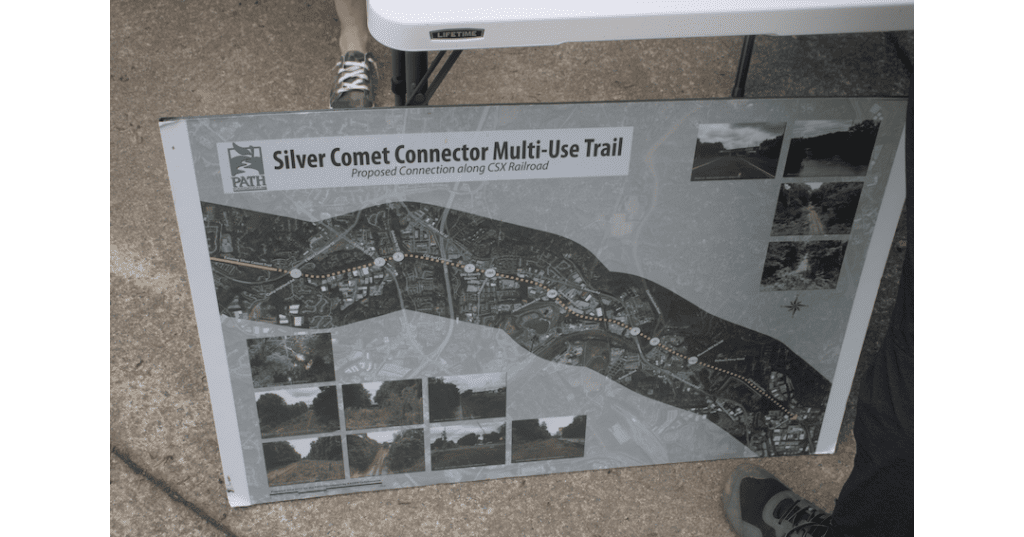
Connect the Comet has been a longtime advocate for linking the popular Silver Comet Trail with the regionally important Atlanta BeltLine.
A link between the Silver Comet Trail in Cobb County and the City of Atlanta across the river has taken on a new significance with the Chattahoochee RiverLands project underway.
The Chattahoochee RiverLands is a planned 100-mile-long network of parks and trails running from Buford Dam on the north to the Chattahoochee Bend State Park in Coweta County on the southern end.
A connection between the Silver Comet Trail and the Atlanta BeltLine would be a big win for the sort of connectivity along the river that the Chattahoochee RiverLands project represents.
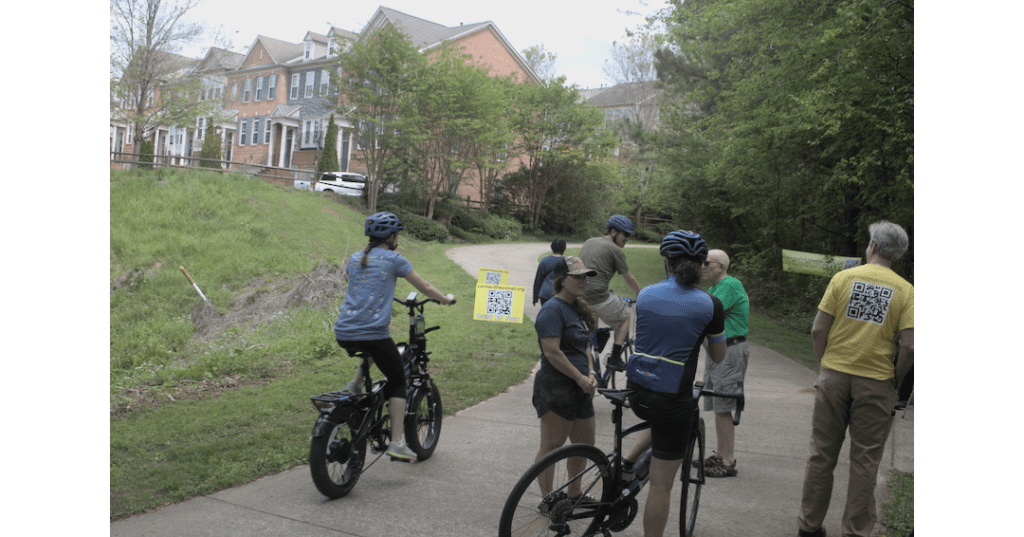
The location where Connect the Comet set up the table was at the point where the 2 miles of undeveloped Silver Comet passenger line right-of-way diverges from the existing trail and continues eastward to Plant Atkinson Road.
Connect the Comet originally began as a project of the River Line Historic Area (RLHA) before becoming a separate organization.
Standing by the table at last Sunday’s event, RHLA founder Roberta Cook gave the Courier a brief summary of where the effort stands.
“We started Connect the Comet because we wanted to connect the Silver Comet with the BeltLine, and we knew the CSX Railroad track wasn’t being used.
“So we thought people ought to get to know about that and advocate for extension of the rail trail.
“And we thought we did get an extension to the rail trail about four years ago, when the Georgia DOT had negotiated with CSX during their lease agreement.
“So we did get 2.3 miles, which was four miles short of what we could have had if CSX had been more accommodating. But even (with) that two miles the PATH Foundation was ready to build immediately.
“They had everything lined up, the track was pulled up, and then it ran into some legal problems (with) the landowners along the alignment. So they had to sort that out.
“And then as far as I know, after that it was delayed due to paper shuffling is what I would call it. And so we think the paper shuffling is on the verge of being over.”
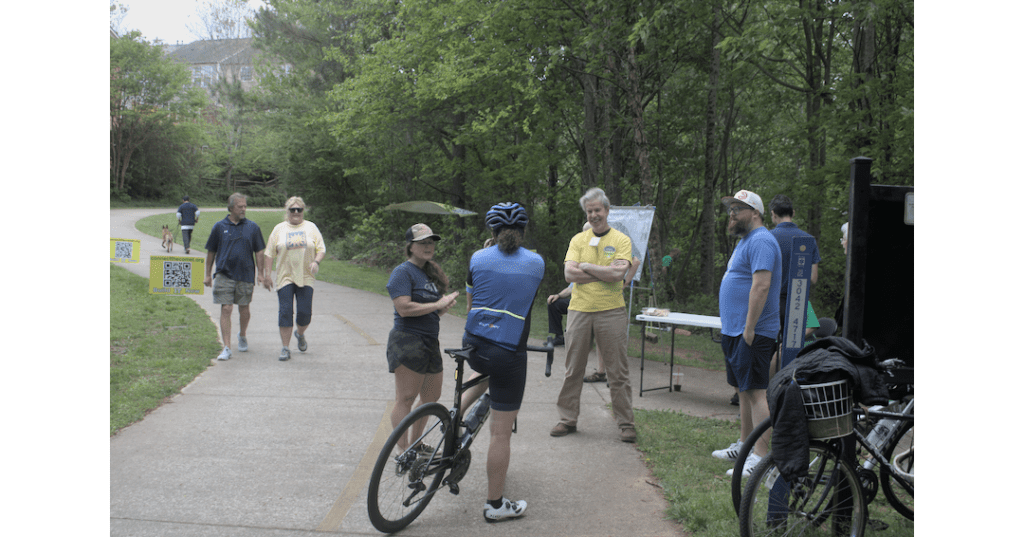
“We’re looking for good news about the PATH Foundation portion that will extend the Silver Comet rail trail from its current ending at the East West Connector and bring it to Plant Atkinson Road, so that Cobb County DOT can do their section from Plant Atkinson Road to the Chattahoochee River.
“And that will, unfortunately, not be part of the rail trail, but it will get us to the river and make connections with trails on that side.”
Cook said that Connect the Comet still hopes CSX will relinquish the additional four miles of track for a more direct connection to the BeltLine.
“They haven’t used (the tracks) in 10 years. We have documentation on our map that shows trees growing through the tracks,” she said.
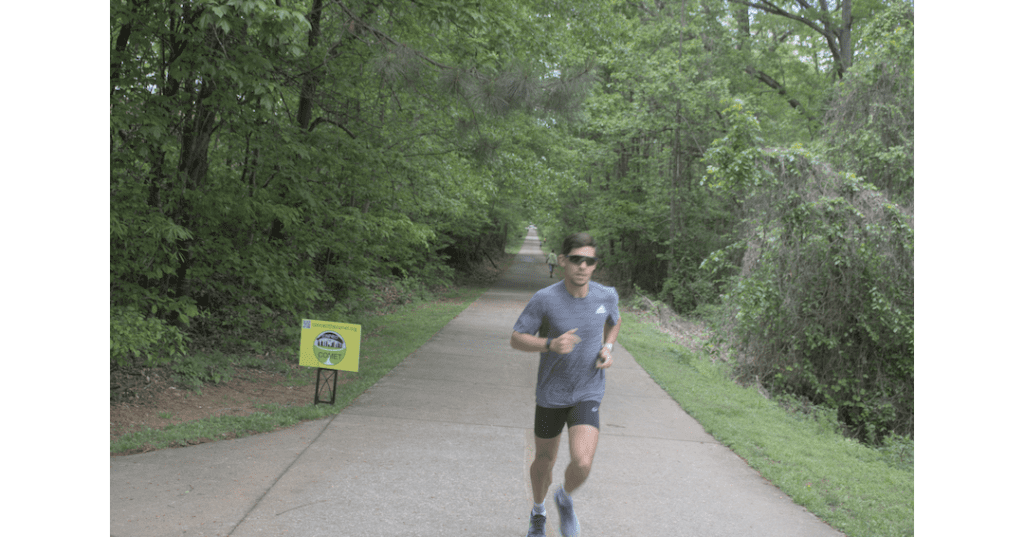
Matt Stigall is a leader of A Better Cobb, an advocacy group formed to advocate for “better transit, more pedestrian and biking options, smarter density, and policies that support sustainable growth.”
Stigall told the Courier that the Silver Comet trail already has a regional impact.
“People from all over the region get on it, and use it to bike,” he said.
“It’s also used for more of a recreational than a commuting trail,” Stigall said.
“But for me, I see the potential when this actually gets connected to the Beltline in the City of Atlanta. You not only increase the impact on the entire region, but you also allow people, if they have an E-bike or something, if the weather’s right, or if it’s the right conditions, they’re able to bike into the city,” he said. “And that’s a car off the roads and less traffic less congestion.”
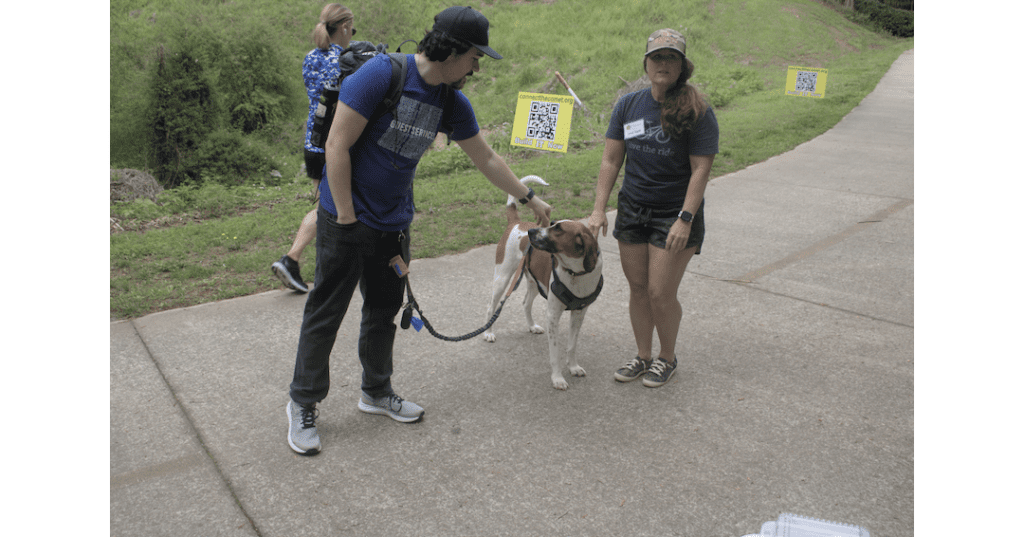
Celeste Burr moved into a home adjacent to the existing Silver Comet Trail.
“Some people dream of retiring and moving to the beach. Some people want to move to the mountains. I moved to the Silver Comet Trail,” she said. “My dream is finally realized.”
“I could get on my bike and go to the office, before I retired. I could go to Stone Mountain if we can get this connection built,” she said.
“I look forward to more trail connectivity because it’s really the wave of the future. We learned during COVID that trails are valuable. It gave us a way to get out,” Burr said.
“I think that more people came to realize the benefit of trying this and I want to keep that movement going,” she said. “I want to make it so that more trails get built, more connections are made and the world can be connected by bike.”
Tony Aeck is an architect who specializes in historic preservation. He lives across the river in the City of Atlanta and has been involved in Connect the Comet since its early days as an organization separate from the RLHA.
“A few years ago, I was reading one of the neighborhood newspapers, and I saw a notice about a meeting on a Sunday afternoon across the river from where I live, for Connect the Comet,” Aeck said.
“I had just recently gotten interested in recumbent bikes,” he said. “And so I bought one, and needed a good place to use it, and the Silver Comet Trail seemed like the logical place.”
“I thought it would be even better if I could get the trail extended near my house, so I wouldn’t have to drive as far,” he said, “and so I went to the meeting. The rest of the story is three or four years of being interested in seeing the vision finally realized”
“There are obviously alternative ways to get from the river to the BeltLine,” he said. “And there may even be, over time, multiple ways, which would be great.”
“I know you’ve seen the old trestle on the CSX right-of-way,” he said. “And I can envision that would be a spectacular crossing someday.”
Aeck said that even if in the interim the crossing is at Atlanta Road, CSX is not using the section of track across the river much, if at all.
“So that gives us hope that eventually, that other route might be joined as well,” he said. “That would provide even greater access from the east, whereas the present route might attract a lot more access from the west,” Aeck said.
“And in talking to the PATH people they’re seeing a lot of interest in the use of electric bikes,” said Aeck, “And that really creates the opportunity for this to become actually a commuting route for a lot of people that could live out here and commute to work downtown or vice versa.”
About the Silver Comet Trail
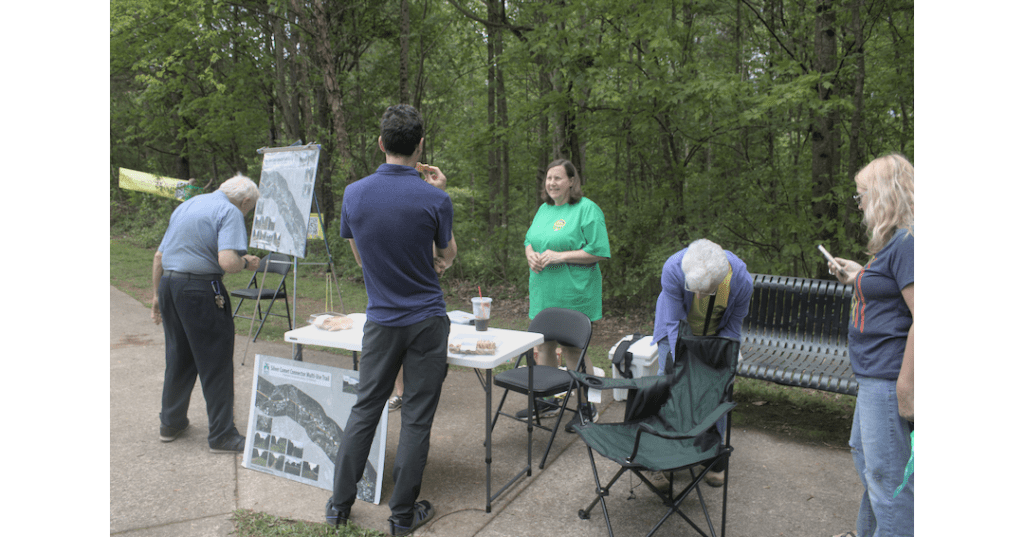
The Silver Comet Trail is built on a portion of the path of the historic Silver Comet passenger train. The Silver Comet was a luxury line created in a last-ditch effort to compete with the rise of the automobile and with the growing commercial airline industry.
The service ran between New York City and Birmingham Alabama. Service began in 1947 and ended in phases between 1968 and 1969 as passenger rail in the U.S. continued its long decline.
Seaboard Air Lines Railroad, a predecessor of CSX, designed and operated most of the Silver Comet line during its run, with Pennsylvania Railroad operating the northernmost section, and the Richmond, Fredericksburg, and Potomac Railroad operating the segment between Washington D.C. and Richmond, VA.
CSX, which absorbed Seaboard, relinquished control of a long section of the abandoned rail line in 1992, and the multi-use path was completed in phases between 1998 and 2008.
The entire trail, when combined with the Chief Ladiga Trail in Alabama, is the longest continuous multi-use trail in the United States. The Silver Comet Trail portion within the state of Georgia is 61.5 miles, while the Chief Ladiga Trail is 33 miles long.

